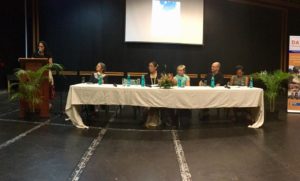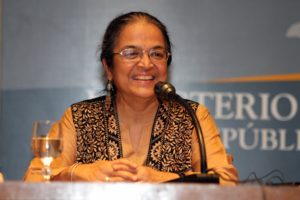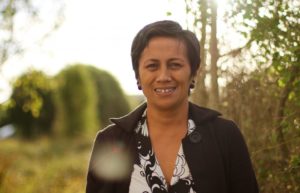DAWN, in collaboration with the Pacific Network on Globalisation (PANG), organised a panel discussion titled “The blue economy: evolving development framework or smoke and mirrors?”.
The objectives of the panel were to bring together various stakeholders from civil society and academia to share their perspectives on the Blue Economy development discourse. The proliferation of interests in this development agenda, not only in the Pacific but globally, calls for more critical discussions to take place and questions to be raised. The panel raised fundamental questions such as what is the Blue Economy? Why the huge interest in it? And to whom will it benefit?
Whilst the speakers’ individual presentations differed on a few aspects, they did bring forward a rich cornucopia of critical concerns for the Oceans that were complementary and interconnected, looking at it with different lenses, such as feminism, climate change and climate science, ocean governance, resources and globalisation, the nature of language in policy and development and indigenous cultural systems.
DAWN’s General Co-coordinator Gita Sen initiated the discussions by outlining the concerns surrounding the Blue Economy, which should not overlook the issues of the privatisation and corporate capture of the Commons through public policy. Following the same lines, Mereoni Chung, DAWN’s Program Officer, spoke to the uncritical way in which the Blue Economy was co-opted into Pacific development policy. Furthermore, she highlighted the parallels between the Green Economy and the Blue Economy, stating that the notion of market-based environmentalism, that price-tags nature, and the suggestion that the marketplace will best protect the environment is flawed. Maureen Penjueli, Director of PANG and Dr. Frances Koya-Vaka’uta, Director of The Oceania Centre for Arts and Culture (OCACPS) at the University of the South Pacific (USP), both had the view that there is this encroachment of the dominant economic paradigm on Pacific Indigenous people’s cultures and traditions vis a vis their relationships with the oceans. Maureen highlighted that this encroachment has a detrimental impact on our oceans, as Pacific people are now appropriating indigenous knowledge and Pacific Ocean Custodian language within their Oceans policies to justify activities such as deep-sea mining in the Cook Islands as just one example.

We know that ocean health is critical. Professor Holland of the Pacific Centre for Environment & Sustainable Development (PACE-SD) at USP, spoke of ocean health in relation to science and ocean services. Dr Hugh Govan reiterated that the ocean’s health is important to the ocean communities and this is linked to management systems in the Pacific. He also highlighted that the uniqueness of indigenous knowledge, customary rights and customary laws in the Pacific have a regulating effect that is exemplary.
The panel closed with a call for more critical awareness and engagements with the Blue Economy development agenda both from academia as well as from civil society. Maureen reiterated in her closing remarks that the Pacific has historically defended the Oceans from exploitative interests and the Pacific people can do it again.
Individual speaker presentations are summarised below.
Gita Sen, DAWN’s General Co-coordinator, opened the event on behalf of both DAWN and the Pacific Network on Globalisation (PANG). DAWN being a feminist network has a very strong approach to gender equality and women’s rights vis a vis any form of justice, economic, social, political and/or cultural. DAWN also strongly advocates that gender justice and equality is not possible without just and fair development – there is no interest in an equal share of the ‘poisoned pie’. If development is not right for everybody especially for the poorest, most vulnerable, most marginalised people – many of whom are women and girls – then there should not be any interest or want in an equal share of the poisoned pie. DAWN has always sought to change the nature of development and gender justice and girls’ human rights in that context, which makes DAWN different from other feminist organisations. DAWN works across four major themes, two of which – the Political Economy of Globalisation and Political Ecology and Sustainability – encompasses and are crosscutting with the work on the Blue Economy. Gita addressed the fierce new world in which everyone lives in today, a world wrought with huge inequalities of both wealth and income and not to mention the limitless and growing corporate powers. We therefore need to think about ways in which we can contend with the forces of globalization and the use of – usually the spoliation of – natural resources that might lead to transformation. Another enormous challenge is navigating the huge cauldron of actors, forces, issues and contentions. The focus on the Blue Economy culminates well with DAWN’s work around Public Private Partnerships (PPP’s); the relationships between PPP’s and the expansion of corporate capture and corporate domination.
The Blue Economy and how we deal with the current panacea for the ocean are major concerns and is coupled with another big challenge; the climate. We may ask the question, in what way are the oceans like climate? Concern around the ocean has not as yet reached the global level in the same way that climate issues have, whilst it is quite obvious that they are intrinsically connected.
Oceans should be as great a global concern as climate and climate change is. They are both the Commons, which are not easy to manage and certainly not private, both, in the ways which they exist and the ways in which they impact people. Furthermore, the strong pressures from privatisation are prevalent, whether for fossil fuels and energy and production or on the site of the oceans, private fishing, etc. Since these are Commons, both have governability issues that are very large and are quite similar to what goes on with the land. The second issue is the shift from small scale community managed production, to private property then to for-profit-big-scale have meant that there is a public policy challenge of corporate capture and regulation of corporate capture. The third issue is that both climate and oceans have large uncertain and unstable effects. The science around climate and climate change and its impacts is a continuum of discovery and learning and it is highly likely that it is the same for oceans. The final issue of concern is the significant and largely harmful impacts on the livelihoods of vulnerable people particularly in the context of the Global South.
Given the complexities of these concerns, critical spaces are needed, not only in terms of understanding but also in terms of civil society action for advocacy, for mobilization and the actions of academics and in research of ‘how we do and what we do.’
Mereoni Chung, DAWN’s Program Officer, offered insights into the Blue Economy development paradigm by asking some hard questions. There is a need for everyone to be more aware of the undercurrents and economic ‘wish lists’ that ‘float’ to the shores of the South Pacific. She stated that as Pacific Islanders, the oceans should be part of our development stories as the ocean is intrinsically linked to our cultures, traditions and identities. The idea of the Blue Economy gained major traction in the build up to Rio +20 with the Pacific SIDS (PSIDS) leading the momentum and placing the Blue Economy in the purview of Sustainable Development action. The Blue Economy agenda has lent a lot of attention to the importance of oceans vis a vis the economic, political, social and importantly environmental aspirations – subsequently this has coincided with the framing of the PSIDS as being Large Ocean States. Mereoni raised the pertinent question of how will the Pacific manage divergent interests, now that we have the world’s attention: “Do we all mean the same thing when we say Blue Economy?” There is some convergence in the aspirations of the Blue Economy with some broad combination of economic benefits with sustainable long-term ocean health. Is there no conflict of interests in Blue Growth? Rather, it is seen that the Blue Growth envisions ‘triple-benefit’ solutions where everyone – our coastal communities, the environment and those that invest – wins. But are there things that hide behind broad aspirational language? Is the devil in the details? Is this a ‘smokes and mirrors’ game?
To contrast, the World Forum of Fisher People charges this view of triple benefits as a power grab by multinational corporations, environmental NGOs, investors and many others to gain control of aquatic resources: a global ocean grab of sorts. Therefore, the ambivalence of the Blue Economy framework reflects the basic tensions in sustainable development between exploiting natural resources for profit and the integrity of natural ecosystems.
Drawing on this insight Mereoni made 3 important points:
1. The language of the economy attached to BLUE, already highlights the economic over the social, marginalising the importance of culture, traditional systems and knowledge, environment, and rights of nature. Ironically, perhaps the success of Pacific States in promoting our Ocean-scape, have been the seeds of its possible subversion and co-option by economic interests and dominant economic forces.
2. Submerged in the language of Blue Economy are very different sectors – tourism, coastal and deep-sea fisheries, aquaculture, transportation, seabed mining, pharmaceuticals, energy, just to name a few. These economic activities do NOT have the same effects, either on ocean health or people’s livelihoods. For instance, seabed mining is hiding in the midst of tourism and fisheries and the sustainable efforts we lend to those two sectors and appears to be getting a free pass under the idea of Blue Growth.
3. The concept of Blue Growth was taken, largely and uncritically, from the idea of green growth. The Green Economy has been widely critiqued; particularly with regards to market-based environmentalism that price-tags nature and suggests that the marketplace will best protect the environment. The same can be said of the critique of the Blue Economy, but the proliferation of this has been slow.
The temptation of viewing the oceans as private and the economic resources coming in may very well lead to the Pacific Island States forfeiting ocean health for economic wealth, utilising the Green Growths market-based approaches to conservation. Mereoni highlighted the controversial use of Marine Protected Areas (MPAs) which is used to justify mineral exploitation in one area against the protection of a marine space in another.
Mereoni concluded her presentation by saying that Pacific Islanders should be at the forefront of these discussions with critical views of the Blue Economy to ensure that OUR oceans do not- yet again- become a testing ground for private and dominant economic interests under the guise of benefitting humankind.
Hugh drew attention to the different sectors with his presentation titled “Prospects for a “Blue Economy” in the “Blue Pacific”.” Hugh highlighted that about 3 billion US dollars are earned in terms of the offshore tuna fishing industry but the returns to the Pacific is miniscule. “Pacific Island Countries (PICs), formed a community of countries with the majority of the fish (Parties to the Nauru Agreement) and effectively combined their jurisdictions under United Nations Convention on the Law of the Sea (UNCLOS) and imposed relatively enforceable controls (Vessel Day Scheme) and are able to impose access and management control successfully.” While it is worth currently 3 billion US dollars, it is actually worth more money than this, yet the Pacific tuna rich countries are getting a minute proportion of the proceeds.
Hugh highlighted the coastal fisheries sector where the Pacific gets the lion share of the value for itself with potential to add more value. This could be recovered more with proper management mechanisms – which the Pacific Islanders have through their indigenous knowledges and systems, customary rights and indigenous rights. In essence exercising these rights (community-based management systems) would have a regulating effect on the coastal fisheries, which is unique to this part of the world.
There is a lot of talk currently on deep sea minerals which has been conservatively estimated to be a trillion-US dollar resource; these US dollar figures are kept private and are not readily available to the public. Hugh gave the example of where the Cook Islands were told that they would get 400 million US dollars to mine deep-sea nodules. This payment would be made over a period of the next 20 years, which when actually analysed in more detail is not a very large figure.
The biggest player in all of this is the tourism sector and the cruise ship sectors. These two sectors generate huge amounts of pollution and most of the money profited does not remain within the region. The big debate then is, who exactly benefits from these industries? Pacific Governments are unfortunately not taking these issues seriously, which then has a follow through impact on PICs. Whilst these sectors depend on the health of the ocean and the Blue Economy, they continue to be badly managed.
Hugh concluded by saying that as a result of many of the newer industries being untested and given the threat of climate change, the Pacific is at a point of uncertainty and how do we know that our Governments are doing everything that they should be doing to protect our oceans?
Professor Holland presentation referred to the crisis of contradictions; that whilst there is a need for conservation, there is also a need for the development of the economy as at the end of the day this is what puts food on the table for people.
Professor Holland said that her knowledge was useful in thinking about the carbon budgets for our planet, as an earth systems scientist – that works on thinking around carbon and nitrogen – having come to the Pacific. She highlighted that 34.2 gigatons of carbon are released from fossil fuels into the atmosphere whilst 4.8 gigatons of carbon dioxide are released from land use. Our oceans are already providing a service in removing 8.8 gigatons of carbon dioxide from the atmosphere, playing an active role enforcing the climate system but this comes at a cost of the changing and rising acidity of our oceans. This thus compromises the ability of the reefs to form, to protect us, to provide the sustainability to absorb 90% of our wave energy.
The commodification of these numbers presents interesting figures. The Melanesian net carbon emissions are minute and pales in comparison to the bigger, more developed nations and therefore we (Melanesia) are absorbing more carbon than we are emitting! In thinking about the commodification of carbon – the ocean sink of the Pacific already absorbs 8.8. gigatons of CO2 per year – the newest way to do so would be to include a social cost of carbon at 57USD per tonne which equates to 502 billion USD per year, an aggregate of 25,080 billion USD over 50 years. Within the EEZs of the Pacific Island countries, that’s 40 billion USD per year. This would be the cost of the service that the Pacific Ocean is providing to the world. She quoted Sitiveni Halapua where he spoke at a Pacific Island Development Forum Meeting and said that the Pacific is providing aid with carbon absorption alone.
Professor Holland concluded by saying that she wants to use science from the Pacific to provide solutions for the Pacific, to illustrate that it is the Pacific Islanders who best know about their trees, oceans, from their own perspectives, from gender perspectives, from cultural perspectives, their knowledges about fisheries and what these collective knowledges can bring together to create a voice for change in the Pacific.
She lies in front of us
Opening her eyes so we may see the sunrise
On the land you and I now call mine
She lies in front of us
Opening her mouth
Breathing life to all creatures around
Yes, she lies in front of us
Opening her body
Gifting us with her mana
Like overflowing liquid of blue gold
Birthing a blue earth of island jewels
Where our ancestors
Sailed to find home
Yes, there she lies in front of us
Caressing our bodies her liquid feeding and flowing
Through us and around us
Her currents excite us
Her changing tides ignite us
Bringing new waves filled with energy
She is filled with so much mana
Yet we under-estimate our wai-tui
Her flowing currents bring up micro-organisms
From the depths of the ocean
Creating a motion of nutrients
Feeding our fish of the deep sea
All the way to our coral reefs
Where our women in fisheries now go out to chest deep
All because of global warming
Look! Our sea levels rising
Taking responsibility to catch fish to feed their mataqali
Breaking our hearts completely
To see plastic pollution flowing in you so freely
One day suffocating you and me
Creating a plastic human biology
In a society already spilled with plastic policies
Who give no apologies for violating your spirit
With their so-called new sustainable technologies
How dare they!
How dare they surf your waves on massive polluted vessels
We don’t see every day and it’s not okay
Our Pacific Ocean is not for play
Not for you to bring your toys into the BBNJ
And rape her purity away
Leaving her and her people
Dying silently
What a monstrosity it would be to extract minerals
From areas connected to our seas only to heal the rich
And have our pacific peoples die out and bleed
Never mind it came from our seas
And you call yourselves stewards of the sea?
What a hypocrisy!
Now, there she lies tears of toxicity
Screaming waves so violently
Destroying our islands
Her body has been violated
Because you stood there silently
No sun rising as she opens her eyes
No breath of life mouth dead open wide
No body to gift our children’s children with
Her mana
Soon we will be called the dead Pacific sea
All because we weren’t strong enough to stand up
To our own societies.
So, let’s unite
Our Pacific oceans and gain some clarity
To be better stewards of these big ocean states
To bring justice to our wai-tui that has connected you to me
And me to you
In a kinship so strong
Let’s not be silent
As she bleeds for you and me.
 Dr Cresantia Frances Koya- Vaka’uta
Dr Cresantia Frances Koya- Vaka’uta
Dr Frances opened her presentation by unpacking the political ways and power relationships between the dominant mainstream paradigm or the ways of thinking about conceptual frameworks such as the blue economy and sustainable development with 3 provocations:
The Blue Economy and all other mainstream concepts and ideas about the good life, the common good, are conceptualised and developed in the Global North – within their systems, promoting their values, their aspirations and for their interests. What this means is that this is ultimately a conversation about the inherent racism of our current systems. It is about power and agency.
The Blue Economy emerges from a long conversation about sustainability that is driven by economic values. Values that are in direct tension with Pacific indigenous ideas and understanding of human ecology and which contradicts Pacific notions of sustainability.
If you are genuinely interested in generating meaningful Public discourse about Blue Economy and about sustainability, we need to seriously think about two emerging issues or ideas: a). Symbolic environmental politics; b). The politics of simulation. Within these discussions, we must recognize the central role that civil society plays, which act as mediators to help mobilize a people movement and resistance when necessary.
Provocation 1: When there is talk of sustainability and sustainable development there is the recognition of the dominant [political] economic paradigm without much thought about cultural discourse. Much of sustainable development talk is siloed. Dr Frances shared her experiences with the vā, through her doctoral studies in Samoa and Tonga, to situate the vā as our conceptual understandings of relationships underpinned by very complex value systems, premised on a world view or standpoint of relatedness. Therefore, research into indigenous ideas of custodianship and its critical role within the global sustainability movement is imperative. This is very much linked to the Blue Economy discourse because the intention of it is sustainable development – but post-colonial legacies of imported systems, centralised and driven by the north fail to address the epistemological racism that privileges a particular body of knowledge whilst marginalising and silencing alternative ways of knowing and living in the world. They are not [of] the Pacific.
Provocation 2: Just as development models and sustainable development models privilege the economic paradigm, we see the environmental or ecological platform reduced to a capitalist resource base that is there to be exploited, and utilized for human consumption. This is contrasted by [our] Pacific cultural ideas about custodianship and the value of the earth, land, sky and sea; taken holistically as critical as our identity as humans and not for economic activity. Culture is then relegated to the side-lines. At worst, culture is seen as a barrier to development; at best, it is a vector for development, but always privileging development and the economic standpoint or power base. Usage in the Pacific draws upon a different kind of symbolism that alludes to the Pacific Ocean identities, in line with Hauofa’s our Sea of Islands, and his assertion that the Ocean is in us.
Provocation 3: The danger of symbolic environmental politics and the performative art of stimulation politics. The 2017 Blue Pacific Framework endorsed by Pacific leaders asserts the Blue Pacific identity to do two things; 1). recapture the collective potential of the oceans shared stewardship of the Pacific Ocean based on an explicit recognition of its shared ocean identity, ocean geography, ocean resources; 2). To reaffirm the connection between Pacific peoples and their resources, environment and culture. But given what we know of the encroachment of the extractive industries in the region, how much of this Blue Economy discourse and Blue Pacific is in fact symbolic politics? If we think about the politics of language, we recognise that discourse is about power and that this multi-layered power play is seen as in the language of choice – 1. English 2. Content of discourse.
Dr Frances’ final provocation comes from the psychology of politics and the power for subliminal messaging used to brainwash and condition. The subliminal messaging in our Blueing of the Pacific Ocean can be seen in two ways, on the one hand, it is part of this movement that is wonderful to rethink, reclaim, rename and reassert our identity as ocean states, or big ocean islands rather than small island states. The more we use it, we hear it, we apply it in everyday language, policy, education, research, we begin the critical re-education process of de-colonising the mind through REVERSE subliminal messaging. On the other hand, these conversations about Blue Pacific identity, Blue Economy, Blue Continent is but a rebranding of the Pacific. It is a marketing agenda to which we are drawn to when they are very clearly about economic agendas. Dr Frances concluded by highlighting what Epeli Hau’ofa meant when he said ‘We are the sea and the ocean, we must awake this ancient truth and use it to overturn all the hegemonic views that aim to ultimately confine us again, physically and psychologically. We must not allow anyone to belittle us and take away our freedom’.
Maureen, Director of PANG, closed the panel discussions by emphasising the language of the Blue Economy and the language found in development policies. How do two innocuous words such as Blue and Economy marry? How do we understand these? Who does it come from? How does it take shape and form? How do we recognise it? And importantly how does it manifest itself in terms of politics and structures? It is really easy to get lost in the world of the colours and their associations with different economies. Maureen said that she is – and we all should be – particularly concerned with the evolution of these two words and the initiation of the qualification of these words with the word sustainable. It becomes, then, Sustainable Blue Economy, and down the slippery slope of adding people centred and people driven – when it really just means economy and growth. This iteration for the word blue, Maureen emphasised, is a signal for the policy trend around acceleration and expansion of ocean activities or activities on the blue body of water – whereas the true description of this would be the ‘industrialisation of our oceans.’
PANG’s lens on the Blue Economy has been looking at resources, deep sea mineral resources in particular, fisheries and most recently in infrastructure. The Pacific is at this juncture partly because there is a new narrative of new technologies, which makes exploitation possible to begin. It is quite enticing, this narrative, to this part of the world that historically has always been described as under-developed.
Maureen touched on the new and emerging components of economy and the need to contest this trend of commodification around environmental services and profits, which are or can be sold on international markets. She made direct reference to carbon sinks in the Pacific, where she asked if the Pacific wanted to go down that road of commodification of all things, including life giving planetary functions?
Maureen warned of the appropriation of cultural identity and Pacific Ocean Custodianship-esque language in development policy. The Cook Islands, for example, have put out a document rationalising the initiation of deep-sea mining based on indigenous understanding and frameworks. Furthermore, this appropriation is reflected in the Pacific Islands Forum Palau Declaration with the use of Epeli Hau’ofa’s thinking, at the same time pushing for the lowest environmental standards to allow sea bed mining.
There is phenomenal and growing interest, now, in the Pacific around the Blue Economy with countless amounts of documents being put forward by countries and international organisations. The EU has the Blue Growth Strategy, China with the Maritime Silk Road Strategy, the Commonwealth’s Blue Charter, the World Bank has the Blue Growth paper, and most recently the EU in partnership with the World Bank have released the Blue Economy Development Framework – Building Resilience to Climate Change.
Maureen acknowledged that we have failed in our attempt to balance the economic, social and the environment which is highlighted by our various planetary crises. We have not yet learnt to constrain the economy, economics, and economic growth models that will roll over into the Blue Economy.
Maureen concluded her presentation by stating that we all now need to consider the movement around giving away the Ocean rights, whether it is a living entity, a life-giving entity because her rights are being violated in ways beyond comprehension. There is a need to have collective efforts between scientists, lawyers, economists, activists, as well as indigenous people and artists, because the Pacific is now located in a time and situation where there is this rush for its resources with the use of clever tricky words.
Resistance is more important today than it has ever been.







